初中英语专题复习:一般疑问句和特殊疑问句(共32张PPT)
文档属性
| 名称 | 初中英语专题复习:一般疑问句和特殊疑问句(共32张PPT) | 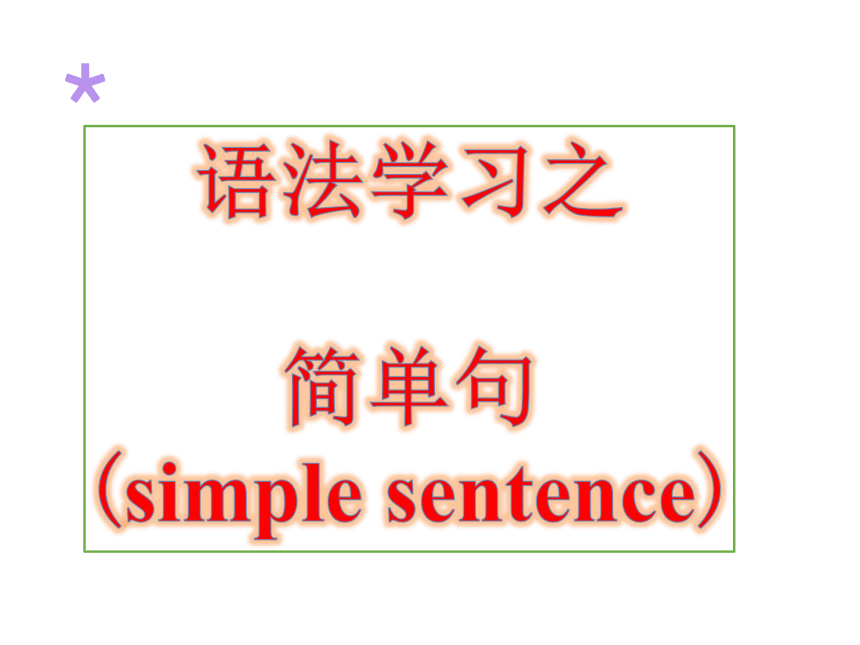 | |
| 格式 | zip | ||
| 文件大小 | 185.7KB | ||
| 资源类型 | 教案 | ||
| 版本资源 | 通用版 | ||
| 科目 | 英语 | ||
| 更新时间 | 2019-06-06 21:26:42 | ||
图片预览

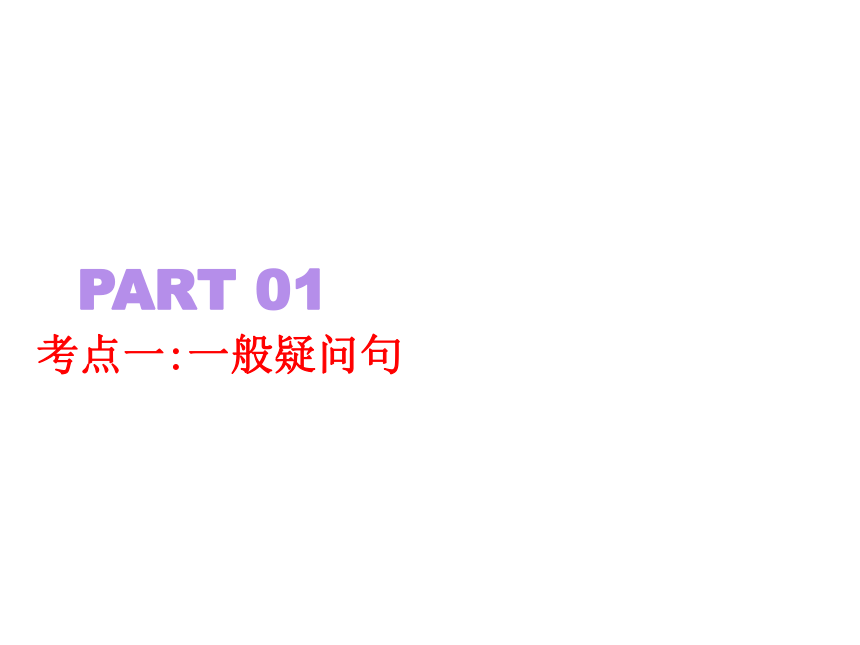
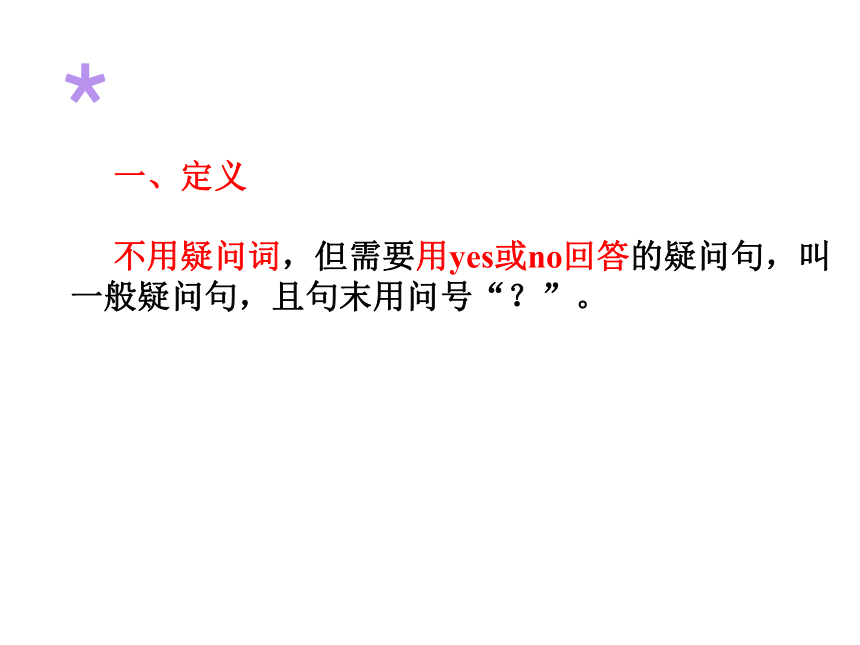

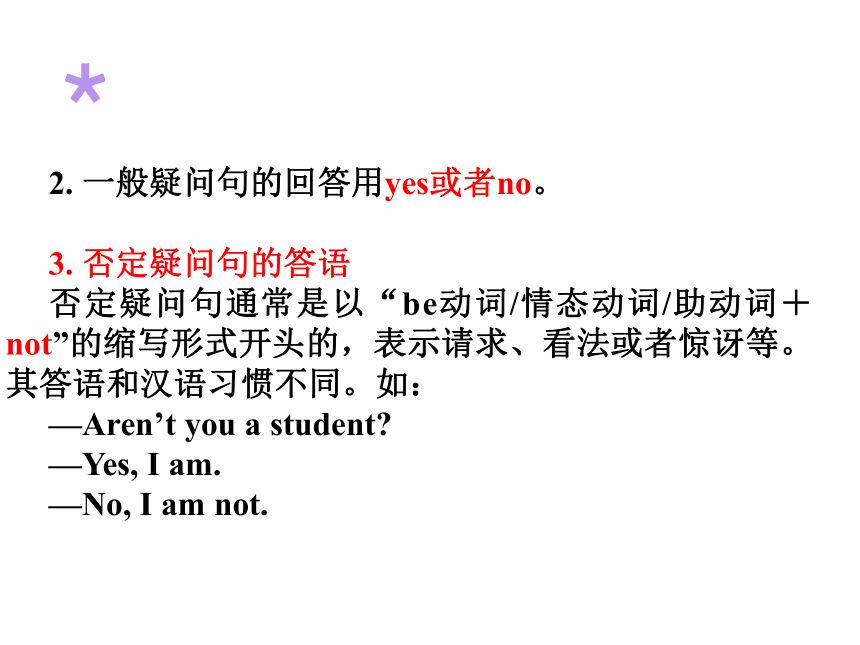
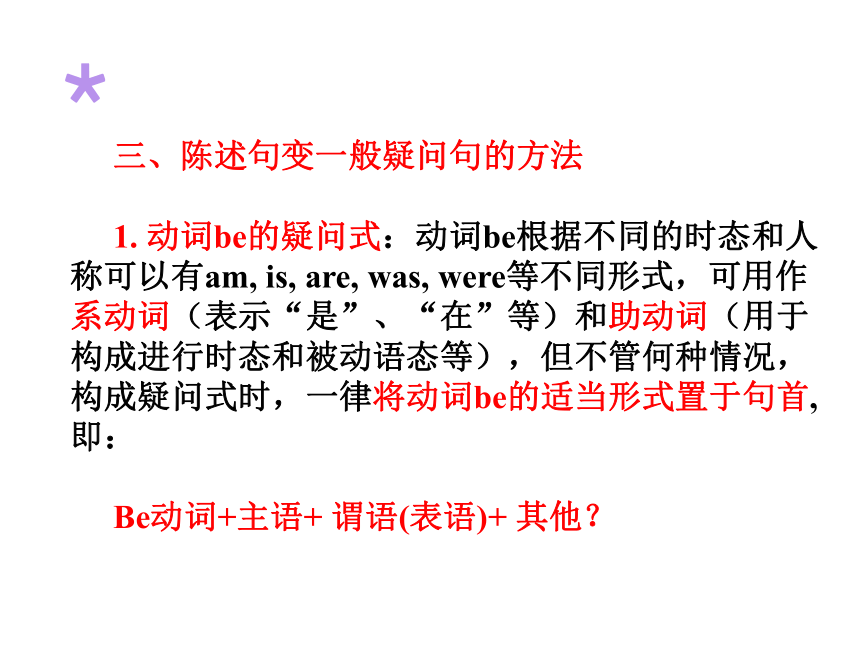
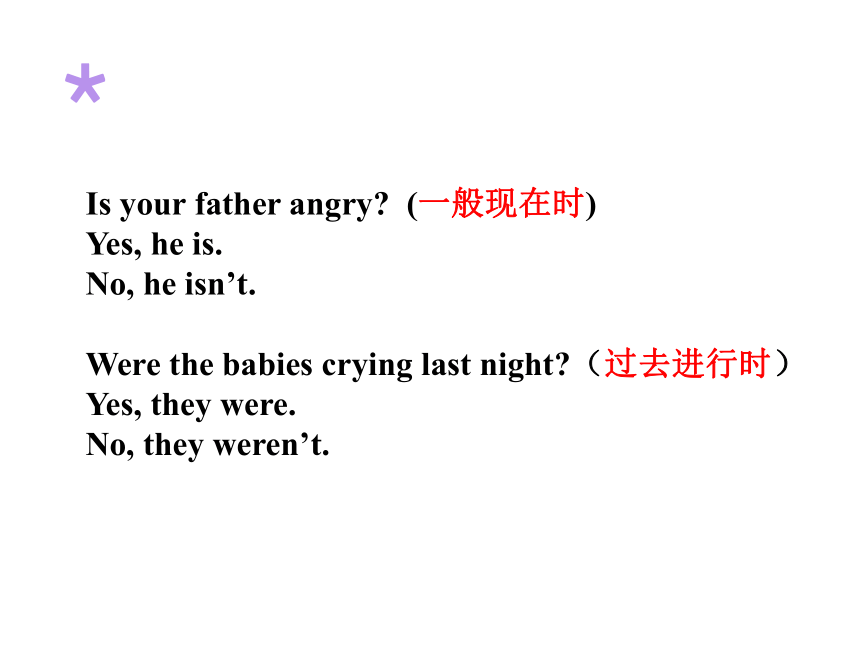
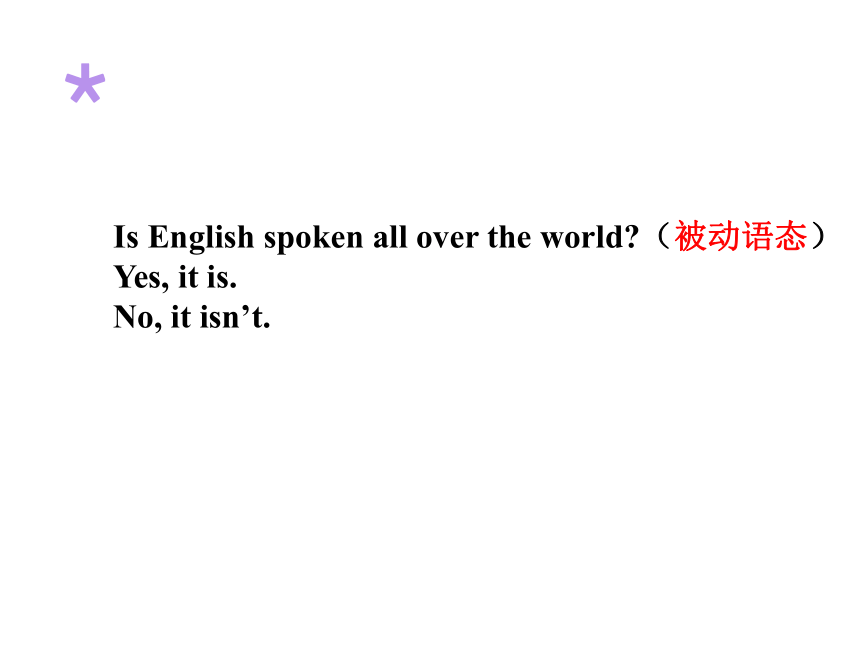
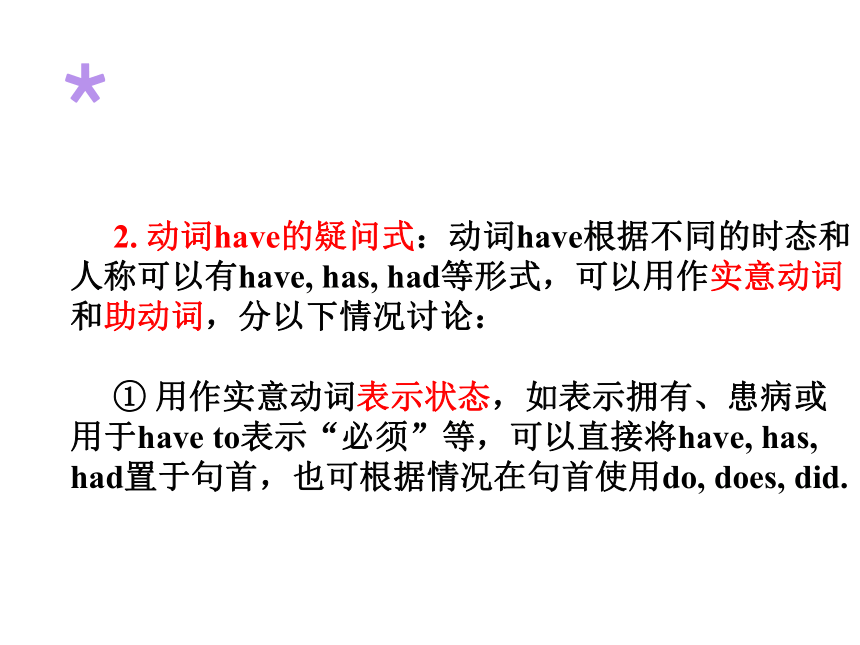

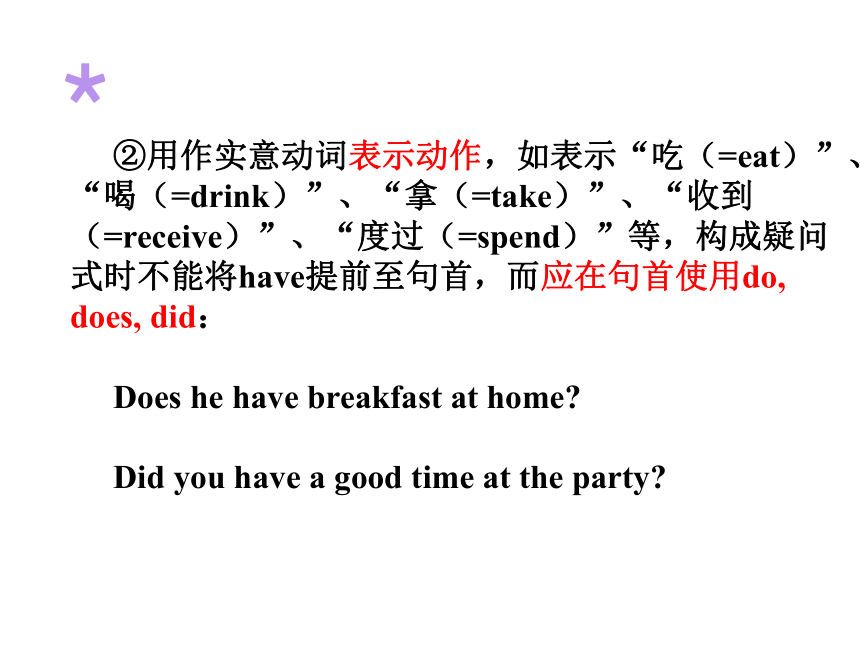
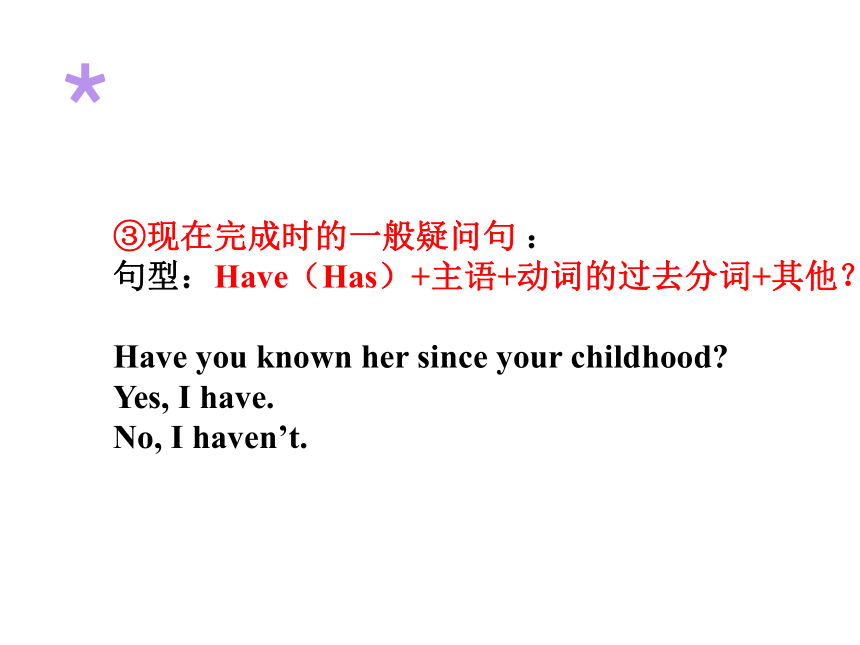
文档简介
课件32张PPT。语法学习之
简单句
(simple sentence)PART 01考点一:一般疑问句
一、定义
不用疑问词,但需要用yes或no回答的疑问句,叫一般疑问句,且句末用问号“?”。
二、一般疑问句的基本用法及结构
1. 一般疑问句用于对某一情况提出疑问,通常可用yes和no来回答,读时用升调。
一般疑问句主要有三种结构:
①Be+主语+其他?
②助动词+主语+谓语动词+其他?
③情态动词+主语+动词原形+其他?
Is he interested in going there?
Does she often have colds?
Can you speak Chinese?2. 一般疑问句的回答用yes或者no。
3. 否定疑问句的答语
否定疑问句通常是以“be动词/情态动词/助动词+not”的缩写形式开头的,表示请求、看法或者惊讶等。其答语和汉语习惯不同。如:
—Aren’t you a student?
—Yes, I am.
—No, I am not. 三、陈述句变一般疑问句的方法
1. 动词be的疑问式:动词be根据不同的时态和人称可以有am, is, are, was, were等不同形式,可用作系动词(表示“是”、“在”等)和助动词(用于构成进行时态和被动语态等),但不管何种情况,构成疑问式时,一律将动词be的适当形式置于句首, 即:
Be动词+主语+ 谓语(表语)+ 其他? Is your father angry? (一般现在时)
Yes, he is.
No, he isn’t.
Were the babies crying last night?(过去进行时)
Yes, they were.
No, they weren’t.
Is English spoken all over the world?(被动语态)
Yes, it is.
No, it isn’t.
2. 动词have的疑问式:动词have根据不同的时态和人称可以有have, has, had等形式,可以用作实意动词和助动词,分以下情况讨论:
① 用作实意动词表示状态,如表示拥有、患病或用于have to表示“必须”等,可以直接将have, has, had置于句首,也可根据情况在句首使用do, does, did.
Does he have [Has he] anything to say?
Do you have [Have you] to leave so soon?
Did you have [Had you] any friends then?②用作实意动词表示动作,如表示“吃(=eat)”、“喝(=drink)”、“拿(=take)”、“收到(=receive)”、“度过(=spend)”等,构成疑问式时不能将have提前至句首,而应在句首使用do, does, did:
Does he have breakfast at home?
Did you have a good time at the party?
③现在完成时的一般疑问句 :
句型:Have(Has)+主语+动词的过去分词+其他?
Have you known her since your childhood?
Yes, I have.
No, I haven’t.
④过去完成时的一般疑问句:
句型:Had +主语+动词的过去分词+其他?
Had he learned about two thousand English words before he came here?
Yes, he had.
No, he hadn’t.
3. 情态动词的疑问式:情态动词的疑问式通常是将情态动词置于句首:
句型:情态动词+主语+动词原形+ 其他?
Can you bring me some apples?
Yes, I can.
No, I can’t.
Can you speak English?
Must I finish the work at once?4. 实意动词的疑问式:一般实意动词的疑问式,通常应根据不同时态和人称在句首加助动词do, does, did等:
句型:Do(Does, Did)+主语+动词原形+ 其他?
Did he do morning exercises yesterday?
Yes, he did.
No, he didn’t.
Do you go to school every day?
Does the boy like dancing?
Did you see the film last night?PART 02考点二:特殊疑问句
一、定义
用疑问词引导的疑问句叫做特殊疑问句。回答特殊疑问句时不能用yes或no且要用降调。为了便于理解、掌握特殊疑问句,我们把疑问词分为三类:
A疑问代词:what,who,which,whose,whom
B疑问副词:when,where,why,how
C疑问形容词:what(which,whose)+名词 一、疑问代词的用法
1. 由what引导的疑问句,此类疑问句可以对主语、表语和宾语提问。
(1)对主语提问
What is in your pocket?
There is an egg in it.
What’s in the room?
There are a lot of chairs in it.
=A lot of chairs are in it.
(2)对宾语提问
What did you buy?
I bought a bike.
(3)对表语提问
What is this?
It's a bench.2. who,whom,whose引导的疑问句,此类疑问句可以对主语、表语和宾语提问。
Who broke the window?
Who is that woman?
Whose is this umbrella?
3. 由which引导的特殊疑问句,此类疑问句可以对主语和宾语提问。
Which is Tom’s?
This is his.
Which does he want?
He wants the green one.二、疑问形容词的用法
当what,which,whose后面跟上名词时,这三个疑问词起形容词作用。
What sports do you like?(对宾语提问)
I like basketball.
Whose pens are these?(对表语提问)
They are Li Ming’s.
Whose father died two years ago?(对主语提问)
Which picture did you take? (对宾语提问)
I took the one on the right. 三、疑问副词的用法
句型:疑问副词+一般疑问句的语序+ 其他?
1.when引导的疑问句:询问时间
When were you born?
(I was born) on June 5.
2.where引导的疑问句:询问地点、场所
Where do you live?
(I live in)Beijing.
Where are you going?
I am going to Japan.
3.why引导的疑问句:询问原因
它的回答只能用because引导的原因状语从句。
Why are you late?
Because I met the accident.
Why didn’t you see the movie?
Because I had seen it before. 4.how引导的疑问句:可分为两类
(1)“How…?”how可单独地置于疑问句的句首,询问如何做某事即做某事的方法、手段及健康、天气等
How do you go to school?(问方式)
How are you?(问健康)
How is the weather today?(2)How +形容词(副词)~?,来询问年龄、身高、数量、次数、距离等。
How many 多少(可数名词)
How many sisters do you have?
How much 多少(不可数名词)
How much is the book?
How old 多大(岁数)
How old are you?
How tall 多高(人,树)
How tall is that tree?
How long 多少时间(多久) ;多长(长度)
How long will you stay here?
How long is the rope?
How often 多久(频率)
How often do you visit here?
How soon 多快(时间)
How soon will he be back?
How far 多远(距离)
How far is it from A to B?谢谢!
简单句
(simple sentence)PART 01考点一:一般疑问句
一、定义
不用疑问词,但需要用yes或no回答的疑问句,叫一般疑问句,且句末用问号“?”。
二、一般疑问句的基本用法及结构
1. 一般疑问句用于对某一情况提出疑问,通常可用yes和no来回答,读时用升调。
一般疑问句主要有三种结构:
①Be+主语+其他?
②助动词+主语+谓语动词+其他?
③情态动词+主语+动词原形+其他?
Is he interested in going there?
Does she often have colds?
Can you speak Chinese?2. 一般疑问句的回答用yes或者no。
3. 否定疑问句的答语
否定疑问句通常是以“be动词/情态动词/助动词+not”的缩写形式开头的,表示请求、看法或者惊讶等。其答语和汉语习惯不同。如:
—Aren’t you a student?
—Yes, I am.
—No, I am not. 三、陈述句变一般疑问句的方法
1. 动词be的疑问式:动词be根据不同的时态和人称可以有am, is, are, was, were等不同形式,可用作系动词(表示“是”、“在”等)和助动词(用于构成进行时态和被动语态等),但不管何种情况,构成疑问式时,一律将动词be的适当形式置于句首, 即:
Be动词+主语+ 谓语(表语)+ 其他? Is your father angry? (一般现在时)
Yes, he is.
No, he isn’t.
Were the babies crying last night?(过去进行时)
Yes, they were.
No, they weren’t.
Is English spoken all over the world?(被动语态)
Yes, it is.
No, it isn’t.
2. 动词have的疑问式:动词have根据不同的时态和人称可以有have, has, had等形式,可以用作实意动词和助动词,分以下情况讨论:
① 用作实意动词表示状态,如表示拥有、患病或用于have to表示“必须”等,可以直接将have, has, had置于句首,也可根据情况在句首使用do, does, did.
Does he have [Has he] anything to say?
Do you have [Have you] to leave so soon?
Did you have [Had you] any friends then?②用作实意动词表示动作,如表示“吃(=eat)”、“喝(=drink)”、“拿(=take)”、“收到(=receive)”、“度过(=spend)”等,构成疑问式时不能将have提前至句首,而应在句首使用do, does, did:
Does he have breakfast at home?
Did you have a good time at the party?
③现在完成时的一般疑问句 :
句型:Have(Has)+主语+动词的过去分词+其他?
Have you known her since your childhood?
Yes, I have.
No, I haven’t.
④过去完成时的一般疑问句:
句型:Had +主语+动词的过去分词+其他?
Had he learned about two thousand English words before he came here?
Yes, he had.
No, he hadn’t.
3. 情态动词的疑问式:情态动词的疑问式通常是将情态动词置于句首:
句型:情态动词+主语+动词原形+ 其他?
Can you bring me some apples?
Yes, I can.
No, I can’t.
Can you speak English?
Must I finish the work at once?4. 实意动词的疑问式:一般实意动词的疑问式,通常应根据不同时态和人称在句首加助动词do, does, did等:
句型:Do(Does, Did)+主语+动词原形+ 其他?
Did he do morning exercises yesterday?
Yes, he did.
No, he didn’t.
Do you go to school every day?
Does the boy like dancing?
Did you see the film last night?PART 02考点二:特殊疑问句
一、定义
用疑问词引导的疑问句叫做特殊疑问句。回答特殊疑问句时不能用yes或no且要用降调。为了便于理解、掌握特殊疑问句,我们把疑问词分为三类:
A疑问代词:what,who,which,whose,whom
B疑问副词:when,where,why,how
C疑问形容词:what(which,whose)+名词 一、疑问代词的用法
1. 由what引导的疑问句,此类疑问句可以对主语、表语和宾语提问。
(1)对主语提问
What is in your pocket?
There is an egg in it.
What’s in the room?
There are a lot of chairs in it.
=A lot of chairs are in it.
(2)对宾语提问
What did you buy?
I bought a bike.
(3)对表语提问
What is this?
It's a bench.2. who,whom,whose引导的疑问句,此类疑问句可以对主语、表语和宾语提问。
Who broke the window?
Who is that woman?
Whose is this umbrella?
3. 由which引导的特殊疑问句,此类疑问句可以对主语和宾语提问。
Which is Tom’s?
This is his.
Which does he want?
He wants the green one.二、疑问形容词的用法
当what,which,whose后面跟上名词时,这三个疑问词起形容词作用。
What sports do you like?(对宾语提问)
I like basketball.
Whose pens are these?(对表语提问)
They are Li Ming’s.
Whose father died two years ago?(对主语提问)
Which picture did you take? (对宾语提问)
I took the one on the right. 三、疑问副词的用法
句型:疑问副词+一般疑问句的语序+ 其他?
1.when引导的疑问句:询问时间
When were you born?
(I was born) on June 5.
2.where引导的疑问句:询问地点、场所
Where do you live?
(I live in)Beijing.
Where are you going?
I am going to Japan.
3.why引导的疑问句:询问原因
它的回答只能用because引导的原因状语从句。
Why are you late?
Because I met the accident.
Why didn’t you see the movie?
Because I had seen it before. 4.how引导的疑问句:可分为两类
(1)“How…?”how可单独地置于疑问句的句首,询问如何做某事即做某事的方法、手段及健康、天气等
How do you go to school?(问方式)
How are you?(问健康)
How is the weather today?(2)How +形容词(副词)~?,来询问年龄、身高、数量、次数、距离等。
How many 多少(可数名词)
How many sisters do you have?
How much 多少(不可数名词)
How much is the book?
How old 多大(岁数)
How old are you?
How tall 多高(人,树)
How tall is that tree?
How long 多少时间(多久) ;多长(长度)
How long will you stay here?
How long is the rope?
How often 多久(频率)
How often do you visit here?
How soon 多快(时间)
How soon will he be back?
How far 多远(距离)
How far is it from A to B?谢谢!
同课章节目录
- 词法
- 名词
- 动词和动词短语
- 动词语态
- 动词时态
- 助动词和情态动词
- 非谓语动词
- 冠词
- 代词
- 数词和量词
- 形容词副词及其比较等级
- 介词和介词短语
- 连词和感叹词
- 构词法
- 相似、相近词比较
- 句法
- 陈述句
- 一般疑问句和否定疑问句
- 特殊疑问句及选择疑问句
- 反意疑问句
- 存在句(There be句型)
- 宾语从句
- 定语从句
- 状语从句
- 主谓一致问题
- 简单句
- 并列句
- 复合句
- 主谓一致
- 主、表语从句
- 名词性从句
- 直接引语和间接引语
- 虚拟语气
- 感叹句
- 强调句
- 倒装句
- 祈使句
- 句子的成分
- 句子的分类
- 题型专区
- 单项选择部分
- 易错题
- 完形填空
- 阅读理解
- 词汇练习
- 听说训练
- 句型转换
- 补全对话
- 短文改错
- 翻译
- 书面表达
- 任务型阅读
- 语法填空
- 其他资料
